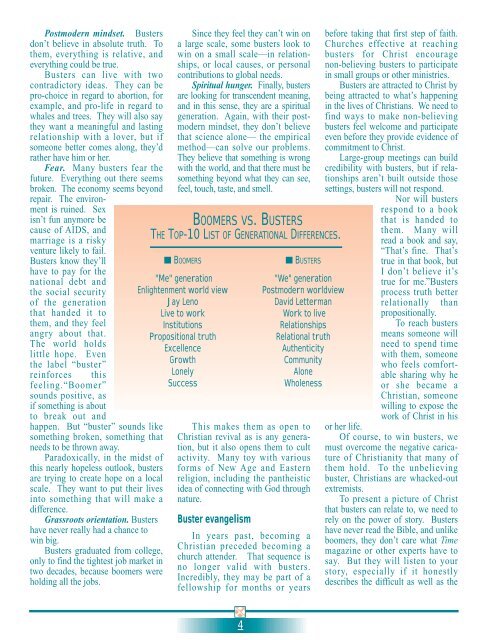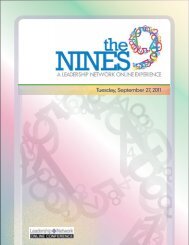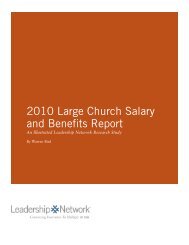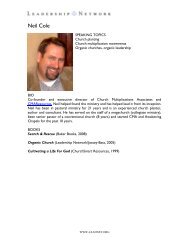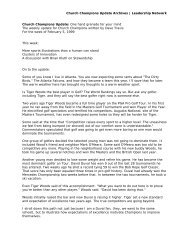ARE WE A PEOPLE AT HALF TIME? - Leadership Network
ARE WE A PEOPLE AT HALF TIME? - Leadership Network
ARE WE A PEOPLE AT HALF TIME? - Leadership Network
Create successful ePaper yourself
Turn your PDF publications into a flip-book with our unique Google optimized e-Paper software.
Postmodern mindset. Busters<br />
don’t believe in absolute truth. To<br />
them, everything is relative, and<br />
everything could be true.<br />
Busters can live with two<br />
contradictory ideas. They can be<br />
pro-choice in regard to abortion, for<br />
example, and pro-life in regard to<br />
whales and trees. They will also say<br />
they want a meaningful and lasting<br />
relationship with a lover, but if<br />
someone better comes along, they’d<br />
rather have him or her.<br />
Fear. Many busters fear the<br />
future. Everything out there seems<br />
broken. The economy seems beyond<br />
repair. The environment<br />
is ruined. Sex<br />
isn’t fun anymore be<br />
cause of AIDS, and<br />
marriage is a risky<br />
venture likely to fail.<br />
Busters know they’ll<br />
have to pay for the<br />
national debt and<br />
the social security<br />
of the generation<br />
that handed it to<br />
them, and they feel<br />
angry about that.<br />
The world holds<br />
little hope. Even<br />
the label “buster”<br />
reinforces this<br />
feeling.“Boomer”<br />
sounds positive, as<br />
if something is about<br />
to break out and<br />
happen. But “buster” sounds like<br />
something broken, something that<br />
needs to be thrown away.<br />
Paradoxically, in the midst of<br />
this nearly hopeless outlook, busters<br />
are trying to create hope on a local<br />
scale. They want to put their lives<br />
into something that will make a<br />
difference.<br />
Grassroots orientation. Busters<br />
have never really had a chance to<br />
win big.<br />
Busters graduated from college,<br />
only to find the tightest job market in<br />
two decades, because boomers were<br />
holding all the jobs.<br />
Since they feel they can’t win on<br />
a large scale, some busters look to<br />
win on a small scale—in relationships,<br />
or local causes, or personal<br />
contributions to global needs.<br />
Spiritual hunger. Finally, busters<br />
are looking for transcendent meaning,<br />
and in this sense, they are a spiritual<br />
generation. Again, with their postmodern<br />
mindset, they don’t believe<br />
that science alone— the empirical<br />
method—can solve our problems.<br />
They believe that something is wrong<br />
with the world, and that there must be<br />
something beyond what they can see,<br />
feel, touch, taste, and smell.<br />
BOOMERS VS. BUSTERS<br />
THE TOP-10 LIST OF GENER<strong>AT</strong>IONAL DIFFERENCES.<br />
■ BOOMERS<br />
"Me" generation<br />
Enlightenment world view<br />
Jay Leno<br />
Live to work<br />
Institutions<br />
Propositional truth<br />
Excellence<br />
Growth<br />
Lonely<br />
Success<br />
■ BUSTERS<br />
"We" generation<br />
Postmodern worldview<br />
David Letterman<br />
Work to live<br />
Relationships<br />
Relational truth<br />
Authenticity<br />
Community<br />
Alone<br />
Wholeness<br />
This makes them as open to<br />
Christian revival as is any generation,<br />
but it also opens them to cult<br />
activity. Many toy with various<br />
forms of New Age and Eastern<br />
religion, including the pantheistic<br />
idea of connecting with God through<br />
nature.<br />
Buster evangelism<br />
In years past, becoming a<br />
Christian preceded becoming a<br />
church attender. That sequence is<br />
no longer valid with busters.<br />
Incredibly, they may be part of a<br />
fellowship for months or years<br />
before taking that first step of faith.<br />
Churches effective at reaching<br />
busters for Christ encourage<br />
non-believing busters to participate<br />
in small groups or other ministries.<br />
Busters are attracted to Christ by<br />
being attracted to what’s happening<br />
in the lives of Christians. We need to<br />
find ways to make non-believing<br />
busters feel welcome and participate<br />
even before they provide evidence of<br />
commitment to Christ.<br />
Large-group meetings can build<br />
credibility with busters, but if relationships<br />
aren’t built outside those<br />
settings, busters will not respond.<br />
Nor will busters<br />
respond to a book<br />
that is handed to<br />
them. Many will<br />
read a book and say,<br />
“That’s fine. That’s<br />
true in that book, but<br />
I don’t believe it’s<br />
true for me.”Busters<br />
process truth better<br />
relationally than<br />
propositionally.<br />
To reach busters<br />
means someone will<br />
need to spend time<br />
with them, someone<br />
who feels comfortable<br />
sharing why he<br />
or she became a<br />
Christian, someone<br />
willing to expose the<br />
work of Christ in his<br />
or her life.<br />
Of course, to win busters, we<br />
must overcome the negative caricature<br />
of Christianity that many of<br />
them hold. To the unbelieving<br />
buster, Christians are whacked-out<br />
extremists.<br />
To present a picture of Christ<br />
that busters can relate to, we need to<br />
rely on the power of story. Busters<br />
have never read the Bible, and unlike<br />
boomers, they don’t care what Time<br />
magazine or other experts have to<br />
say. But they will listen to your<br />
story, especially if it honestly<br />
describes the difficult as well as the<br />
4


